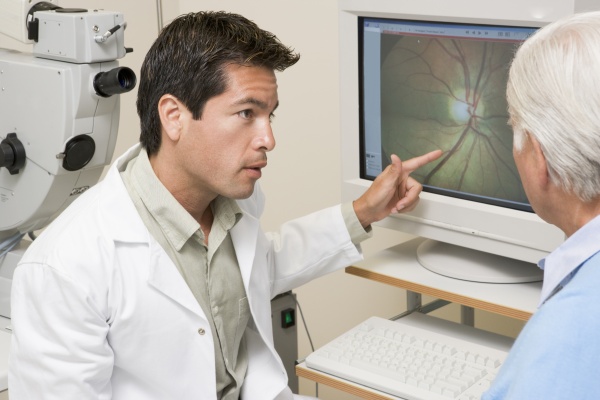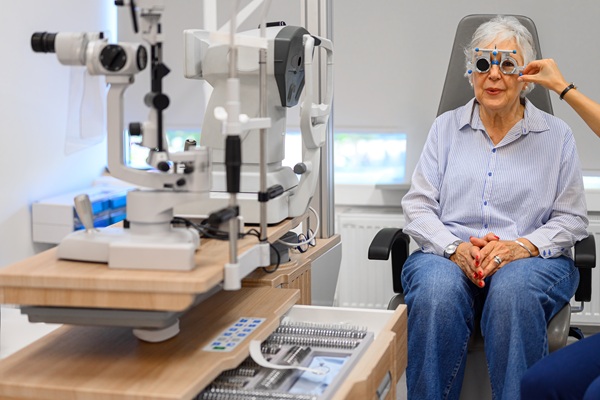How an Optometrist Diagnoses and Treats Macular Degeneration

Wondering if you should see an optometrist to diagnose your current eye problems? Optometrists are eye care professionals who can diagnose eye disorders and eye diseases in their patients. When it comes to treating any eye problems that may be found, optometrists can provide their patients with a proper diagnosis, as well as explain the treatment options available to ensure that their eyes can once again be in optimal health.
What is macular degeneration?
Learning more about how an optometrist can help if you are currently experiencing eye problems is a great idea. This common eye disorder is caused when the center portion of the retina begins to deteriorate. It is more commonly found in those 50 and older. A common sign associated with this disease as a loss of central vision, which slowly but surely makes it difficult for those diagnosed to have clear vision.
According to the American Macular Degeneration Foundation, macular degeneration is the leading cause of vision loss, affecting more than 10 million Americans, which is more than cataracts and glaucoma combined.
How optometrists diagnose macular degeneration
Optometrists are able to diagnose macular degeneration in their patients by performing an eye exam. The patient will first receive eye drops, as this allows the optometrist to view the inside of the eye. This is important beause this eye disease directly affects the retina, which can only be seen using a special lens. Patients may also be asked to look at a grid, which helps the optometrist determine whether the patient is experiencing any blurry vision or blank spots.
How an optometrist diagnoses and treats macular degeneration
There are two different types of macular degeneration: wet and dry. It will depend on whether the patient is diagnosed with wet macular degeneration or dry macular degeneration when it comes to how an optometrist will treat the disease.
Wet macular degeneration is often treated by informing the patient of dietary changes they need to make in order to slow down the progression of the disease. It is also necessary for certain patients to take nutritional supplements. Patients are also encouraged to exercise on a regular basis and avoid smoking.
Dry macular degeneration can be treated by an optometrist if the disease is still in its earliest stages. Treatment for this particular type of macular degeneration includes undergoing laser treatment and having certain eye medications injected into the area, which only slows down the progression of the disease. The goal for those diagnosed with this type of macular degeneration is to prevent the disease from progressing.
Are you in need of an eye exam?
Would you like to make an appointment with our optometrist today? The only way you can understand the current state of your eye health is to have your eyes examined by an experienced eye doctor. If any eye problems are found, then you will be informed of what the next steps should be, which will be included in your eye care treatment plan. If you are currently experiencing any eye problems, please let us know when you call us to schedule your appointment.
Request an appointment here: https://brighteyesny.com or call Bright Eyes Optometry at (914) 730-9574 for an appointment in our New Rochelle office.
Check out what others are saying about our services on Yelp: Read our Yelp reviews.
Recent Posts
An ophthalmologist visit becomes important when eye symptoms go beyond routine vision changes and signal disease, injury, or sudden shifts that need medical or surgical eye care. An ophthalmologist is a physician who diagnoses and treats eye conditions and performs eye surgery when needed.Many people search "optometrist" when they mean ophthalmologist, and the term often…
Cataract treatment can help you regain clearer vision and improved daily functioning. Professional care from an experienced optometrist offers benefits that can improve your long-term eye health and overall quality of life. The following guide outlines the three major benefits of cataract treatment provided by a trusted, experienced optometrist.During regular appointments with an optometrist, they…
Prescription glasses are an important part of clear vision and eye health. However, if you break or damage your glasses, it is important to act quickly to avoid further problems and restore your sight. Fortunately, taking care of damaged prescription glasses as soon as possible can save you time, money, and discomfort.The first step after…
Dry eye may start with mild irritation, but over time, it can begin to interfere with focus, comfort, and even quality of life. An optometrist can help when this condition becomes more than just a temporary annoyance. There are many potential causes of dry eye, including hormonal changes and seasonal allergies. With tools that reveal…


